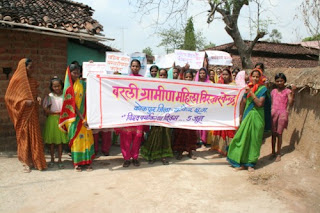 Born near Garvagh, Co. Londonderry, he has spent 20 years as Manager of Barli Development Institute for Rural Women, Indore in the State of Madhya Pradesh the multifaceted man has literally developed the Institute takes care of logistics & maintenance, infrastructure development, gardens & food production, information technology, audio visuals, environmental education, development & transfer of solar technologies, research and development, rural technologies.
Born near Garvagh, Co. Londonderry, he has spent 20 years as Manager of Barli Development Institute for Rural Women, Indore in the State of Madhya Pradesh the multifaceted man has literally developed the Institute takes care of logistics & maintenance, infrastructure development, gardens & food production, information technology, audio visuals, environmental education, development & transfer of solar technologies, research and development, rural technologies.For the last 10 years, he has been the pioneer in central India for manufacturing the large community solar kitchens in Madhya Pradesh with, ten meter square parabolic reflectors at the Institute, and installed then in tribal school hostels in Jhabua, Dattigaon, Dhani and an orphanage in Indore.
More than 300 domestic parabolic cookers in use in rural and tribal communities, these are sources of livelihood in a village Nathudhana , and in another district Jhabua, the tribal women thank him for giving a technology which is “gender friendly” “more easy to use”, “more safe and hygienic than firewood”. For them to go to collect wood is not just walking long distances in search of wood, it is also a struggle because of the numerous threats that they encounter along the way. For instance, walking through isolated areas makes them vulnerable to abuse and rape. They also suffer mental and physical harassment from forest officials, who stop them under the garb of enforcing rules and regulations relating to trespassing. The way back home is even tougher, when these women have to carry heavy loads on their backs. This is the time when they face the greatest threat. The maximum numbers of rapes in these areas occur during this time, when the women stop for a while to drink water, rest or relieve themselves. Of late he has installed Solar Water heating systems, Solar Dryers, Solar Oven, Water Distiller and briquetting etc. Jimmy’s work to promote solar cooking is another integral part of the main goal of the Barli Development Institute - the empowerment of young women through education and training.
Among 500 tribal communities, popularly loved and known as Jeejaji ( Brother in law) since 1988 when he married their didi (sister)Janak Palta McGilligan who was also, a Baha’i pioneer from Chandigarh, Punjab invited by National Spiritual Assembly of the Baha’is of India to establish the Institute For Rural women in Indore in, 1985 a Baha’i inspired NGO, is the centre of their world, their home and their work, their passion and the purpose of their life. British citizen, a land reclamation and drainage contractor, left his country in 1986 to work on reclamation of saline soils at Rabbani School near Gwalior and to serve the rural communities in India in responce to the call from the Baha’i World Centre.
People who have seen the eco friendly Barli campus before and after his presence can only see how Jimmy has put his mind body and soul in to this Institute in it overall development that has contributed to the empowerment of more than 4000 rural and tribal socially and economically disadvantaged young girls and women who have returned to their community’s as social change agents.
The trainees are taught vocational skills, health, literacy and personal and environmental development with a systematically designed and published curriculum, are constantly monitored updated and improved. According to him it is very important for women to be educated and empowered in any society being the first educators of their children and their status should never be seen as secondary to that of men.
Amongst many other challenges he had to rise to in India, learning to communicate in Hindi was perhaps one of the most essential. Jimmy has
 managed to learn by simply picking up Hindi He is modest about his language skills and jokes that he has been here for 20 years and still can’t speak Hindi, while the joke being that he makes this claim in Hindi. He gives credit of this honour to Barli Institute, all its trainees and the staff with whom he works.
managed to learn by simply picking up Hindi He is modest about his language skills and jokes that he has been here for 20 years and still can’t speak Hindi, while the joke being that he makes this claim in Hindi. He gives credit of this honour to Barli Institute, all its trainees and the staff with whom he works.Photo Above; Members of Jimmy's Family celebrating near Limavady in Northern Ireland
Posted By Janak Palta McGilligan
Visit our web site Email us
Coments are welcome
 The May 2008 Edition of Barli Ki Duniya (World of Barli) in now online it can be found at
The May 2008 Edition of Barli Ki Duniya (World of Barli) in now online it can be found at 


